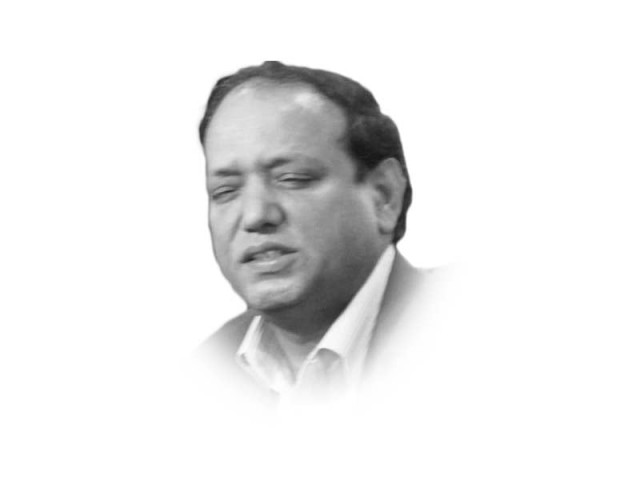Right to information, wrongs of implementation
Explicit constitutional protection accorded to the right to information is commendable

The writer is the author of Disabled by Society and The Wise Man and is associated with Centre for Peace and Development Initiatives. He is also the coordinator of Coalition on Right to Information and tweets
@XahidAbdullah
The first-ever right to information law in the country was promulgated in the shape of the Freedom of Information Ordinance 2002 by a military dictator, with replicas of this highly ineffective law being adopted by political parties in Balochistan and Sindh in the shape of the Balochistan Freedom of Information Act 2005 and Sindh Freedom of Information Act 2006. The PML-N and the PPP committed in the Charter of Democracy, signed as far back as 2008, that a new law on the right to information will be enacted and the Freedom of Information Ordinance 2002 will be repealed. The PPP completed its tenure of five years ruling at the federal level from 2008 to 2013 and the PML-N is half way through its tenure. Other than a plethora of intermittent promises by the high and mighty of both parties, legislation itself remains a pipe dream at the federal level and in Sindh and Balochistan. During the PPP government’s tenure, its leaders made a flurry of promises that a new right to information law for federal public bodies was soon going to be enacted. After being designated prime minister, Yousaf Raza Gilani, in his address to parliament on March 29, 2008, said, “A new freedom of information law will be brought to promote press freedom.” Former president Asif Ali Zardari, while addressing the joint session of parliament on September 22, 2008, stated that “we will soon be bringing other fundamental laws, such as the freedom of information bill”. On November 21, 2008, Sherry Rehman, the then federal minister for information and broadcasting, said that “the freedom of information bill will shortly be tabled in parliament after incorporating views of the provincial governments”. Similarly, the then federal minister for information and broadcasting, Qamar Zaman Kaira, on March 22, 2010, said that “access to information is a fundamental right of every citizen in a democracy and the government will incorporate maximum input of all stakeholders to make an effective legislation on the right to information”.
The PML-N’s track record on this front is similar to the PPP’s, if not worse. Punjab Chief Minister Shahbaz Sharif, during his earlier tenure from 2008 to 2013, failed to enact a law for the country’s biggest province — housing over 100 million people — despite repeated demands of civil society groups. Interestingly, he promised on March 17, 2013, that “the first legislation to be passed by the next Punjab Assembly will be the right to information law, if the PML-N came to power”. However, it did nothing of the sort until it found the shoe on the wrong foot when the PTI promulgated the Khyber-Pakhtunkhwa (K-P) Right to Information Ordinance 2013 on August 18, 2013. The PML-N was left with no option but to promulgate a law for the province on October 4, 2013. Similarly, once the PTI-led K-P government enacted the right to information law on October 31, 2013, the Punjab Assembly also followed suit. The dichotomy between the PML-N’s public claims with regard to transparency and right to information and what it actually practises is amply demonstrated in the way the Punjab bureaucracy has created hurdles in the way of implementation of the Punjab right to information law. Through its time-tested bureaucratic shenanigans, it delayed the release of funds to the Punjab Information Commission. It goes to the credit of the members of the commission that they have taken landmark decisions on different aspects of right to information despite being severely hampered by the Punjab government neither providing them with the requisite staff, nor approving the commission’s service rules so that it could hire on its own. The low priority accorded to transparency by the PML-N is also apparent from the fact that it has failed to table in parliament, the right to information bill approved by the Senate Committee on Information and Broadcasting on July 15, 2014, contrary to public pledges by its leaders.
The PPP not only failed to enact the right to information law at the federal level in its five-year tenure, it has not even enacted the law for Sindh. There is need for serious soul-searching on the part of political parties as to why the public pronouncements of their senior leaders have not translated into action. Is it because of corrupt elements in their ranks who want to follow an all-too-familiar script of loot and plunder in cahoots with corrupt public officials? Or, is it because bureaucrats are tuned to out-dated colonial laws, and legal and administrative procedures, aimed at subjugating people rather than serving them? Once they come into power, do our leaders go out of tune with reality? Whatever the case may be, if politicians are interested in clean governance, they will have to embrace the concept of transparency. For this to happen, they need to enact the right to information laws at the federal level, and in Sindh and Balochistan, and ensure their implementation.
Published in The Express Tribune, November 28th, 2015.
Like Opinion & Editorial on Facebook, follow @ETOpEd on Twitter to receive all updates on all our daily pieces.















COMMENTS
Comments are moderated and generally will be posted if they are on-topic and not abusive.
For more information, please see our Comments FAQ